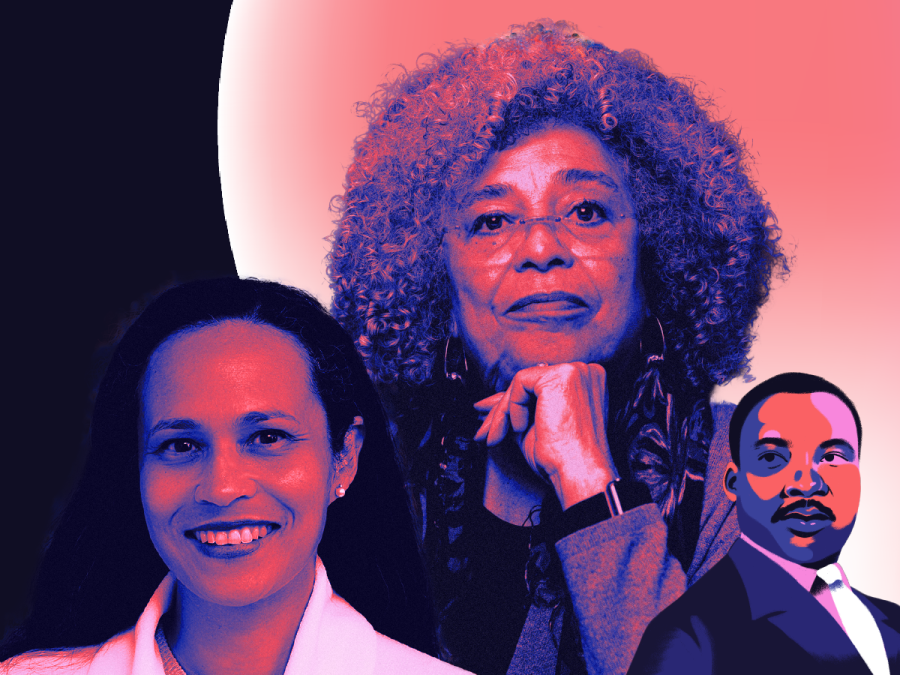Angela Davis addresses Black global consciousness at NYU event
NYU Abu Dhabi hosted a virtual event with Angela Davis, a leader in the Black liberation movement, where she discussed her experiences with combating global systemic oppression.
Angela Davis speaks at a virtual event hosted by NYU Abu Dhabi. Davis is a world-renowned author, scholar and political activist. (Image courtesy of NYU Abu Dhabi)
February 4, 2022
Activist, author and philosopher Angela Davis honored the NYU community on Feb. 2, joining sociologist Ann Morning in a conversation about the Black diaspora and global systems of oppression. The online seminar, hosted by NYU Abu Dhabi, kicked off a series of events commemorating NYU’s 17th annual MLK Week and celebrating Black History Month.
Davis is a renowned voice of the Black liberation movement and has worked to dismantle systems that uphold racial, economic and gender-based oppression worldwide. Morning, a CAS sociology professor, began the conversation by asking Davis for advice on improving her understanding of the Black global consciousness.
Davis said that she first realized the Black community’s global presence during the time she spent in New York City in her youth. Her high school was located in Greenwich Village, near NYU’s Washington Square campus, and her mother completed her master’s degree at the university.
“We spent three summers in New York, and I’ll never forget first hearing Black people speak Spanish and recognizing what we considered the Black community — the Negro community at that time — was far vaster,” Davis said. “I think that the kind of internationalism — political internationalism — that I encountered early on made me recognize that what we now call Black consciousness stretched beyond the particular national borders of the U.S.”
One of Davis’ close friends in high school was the daughter of a lawyer for the Cuban government during the Cuban Revolution. Their friendship gave her the opportunity to understand, at a young age, a movement that fought for an end to segregation.
“I can probably give you many other examples of becoming aware of a global struggle for equality that involved racism,” Davis said. “But at the same time, it was directed against capitalism. I think this anti-capitalist, anti-racist consciousness was necessarily internationalist.”
In the late 1960s, Davis joined the Black Panther Party. Later, in 1970, she was charged with aiding the attempted escape of George Jackson, a fellow member of the organization, and was imprisoned for two years. As a member of the Communist Party USA, Davis believed that internationalism was integral to anti-capitalism. She spoke with Morning about the global solidarity she felt during her imprisonment.
“I have to constantly remind myself that it’s that mass energy, that movement, that was the central character — not me as an individual,” Davis said. “We’ve seen this now in the recent period ushered in by the pandemic and the lynchings of George Floyd and Breonna Taylor — that we need an anti-colonial, anti-racist, anti-capitalist, anti-heteropatriarchal movement all over the world.”
Looking toward the contemporary global struggle for Black liberation, Morning said that although many countries stand in solidarity with American anti-racist movements, they sometimes fail to recognize their own cultures of racism. Davis agreed, saying that there was no acknowledgment when she traveled to France that the country had helped reproduce global racism.
“All too often, the U.S. has been designated as the site of the production and the unfolding of racism,” Davis said. “We don’t give as much attention to the fact that colonialism was a global phenomenon. It was out of colonialism and slavery that what we now know as structural or systemic racism emerged, and it was not confined to the U.S. or to this hemisphere.”
Davis also emphasized the importance of recognizing that the global Black struggle predates efforts in the United States. She encouraged American activists to broaden the scope of their research and work to include international social movements.
“We’re celebrating Black History Month — but why don’t we include Haiti in that celebration?” Davis said. “We know that struggles against slavery in the U.S. were inspired by the struggles of the people of Haiti against the French colonizer. We would not have this history of struggle inside the United States if it were not for the Haitian Revolution. But we rarely make that connection.”
Morning then brought up the topic of global Black identities, noting that some people of African descent do not identify as Black or have an understanding of the concept of Blackness. Morning asked whether or not the fluidity of the Black identity challenges global Black consciousness.
“I think that we have to let go of the notion that there is any fixed definition of Blackness; it has always been fluid, it has always changed,” Davis said. “Race is socially constructed. Blackness is not a thing that we can pin down and describe now and forever.”
Davis pointed to an increase in Brazilians identifying as Black — currently 56% — as a result of anti-racist movements in Brazil. The work of Afro-Brazilian feminists like Lélia Gonzalez and Marielle Franco have empowered many Brazilians to re-examine their identities.
She concluded the conversation by acknowledging the contributions of other communities that have participated in Black struggles.
“People of all racial and ethnic backgrounds have played central roles in the struggle for Black freedom, precisely because victories in the struggle for Black freedom represent victories for everyone,” Davis said.
Contact Alina Hollister at [email protected].
























































































































































